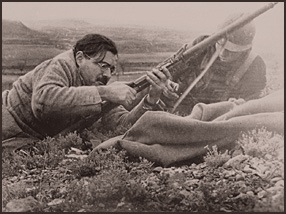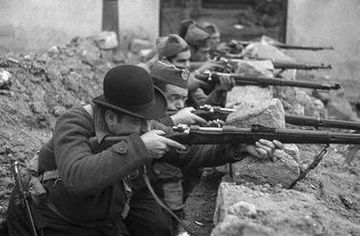The Spanish Civil War
And the World It Made
Richard Rhodes
(Simon & Schuster)
The Spanish Civil War was our last chance to romanticize war. We feared that sentimental idealization of arms and the man had been banished by WWI, but in Spain, we found the good guys, the Republicans pitted against the bad guys, the Nationalists. There were dictators (who essentially fought the war for the Spanish Nationalists) at a time when Hitler was praised for getting Germany out of the Depression and Mussolini worshipped for making the trains of Italy run on time.Those of us who cared for right and wrong found our heart in the battles at the Ebro, the Valley of Jarama, the destruction of Madrid, the murder of Federico García Lorca by the Guardia Civil --- this gave us all we needed to see the Civil War as a holy war.
We certainly detested Francisco Franco, who, when the war was over, said, "Our regime is based on bayonets and blood, not on hypocritical elections." His lieutenants ordered the bombing of Guernica by the German air force's Condor Legion and the Italian Aviazione Legionaria. Hundreds of civilians died in the raid of a city that had little in the way of military value.
The conspiracy of the generals was joined at the beginning of hostilities, in 1936, and for the next three years, Germany and Italy teamed up with Franco's military to murder the democratic republic in the cradle. And Guernica represented the first time --- outside of Winston Churchill's gas bombing of the Arab and Kurdish peoples of Iraq in 1920 --- that a city was bombed to punish the population for being on the wrong side.
It was Monday, 26 April 1937, market day, with men, women, children crammed into the village square. The town of 7,000 was devastated by German Heinkel 111Bs and Junker 52 trimotors which carpeted it with fifty tons of explosives. With bombs and incendiaries and machine guns and strafing, seventy percent of the town's buildings were destroyed.
Some observers saw the significance at once. George Steer of the London Times filed a report the day after: "The town lay far behind the lines. The object of the bombardment was seemingly the demoralization of the civil population and the destruction of the cradle of the Basque race."
§ § § Many of us were too young to worry about war in 1936. It was our parents and our parents' parents who raised money here and around the world, speaking up for the Republicans, denouncing "Los Cuatros Generales" --- the four generals who led the Nationalist troops in rebellion (Francisco Franco Bahamonde, Emilio Mola y Vidal, Miguel Cabanellas, and José Sanjurjo).
It was Jaén and Jarama and Teruel and Ebro and Brunete (names that would later bring a tear to the eyes of those of us who sided with the government against the forces of insurrection). World-wide participation was the key, with the entrance of the International Brigades, an estimated 50,000 volunteers who went to Spain between 1936 and 1938 to do battle. It is said they represented fifty-three countries, mostly workers, primarily from France, England, Germany, Poland and the United States.
For those of us who lived it, it was a passionate romance --- both literal and literary --- with 1930s Spain. Hell and Good Company pays homage to the romancers, those who went there to participate or report, especially the famous who ended up in the Hotel Florida, in Madrid, in 1936: Laurie Lee, Martha Gellhorn, George Orwell, Stephen Spender, John Dos Passos, Ernest Hemingway. As Virginia Cowles wrote in her autobiography, Looking for Trouble,
I don't suppose any hotel has ever attracted a more diverse assembly of foreigners. They came from all parts of the world and their backgrounds read like a series of improbable adventure stories. There were idealists and mercenaries, scoundrels and martyrs; adventurers and embusqués [deserters]; fanatics, traitors, and plain down-and-outs. They were like an odd assortment of beads strung together on a common thread of war. Any evening you could find them in the Florida; Dutch photographers, American airmen, German refugees, English ambulance drivers, Spanish picadors and Communists of every breed and nationality.
And Josephine Herbst reports on the novelist, "There was a kind of splurging magnificence about Hemingway at the Florida," she wrote.
He was stingy with his feelings to anyone who broke his code, even brutal, but it is only fair to say that Hemingway was never anything but faithful to the code he set up for himself. He could give an ambulance [to the cause] but would not be able to stomach [someone] stealing jars of jam on the sly. It wasn't soldierly.
Rhodes spends a great deal of space (perhaps too much) on the making of the painting "Guernica," and as we read the endless gyrations of Picasso, the sketches, the revisions, the doing and undoing, all we can think of is the final droll evaluation of the painting made years later by movie director Luis Buñuel,
I can't stand Guernica (which I nevertheless helped to hang). Everything about it makes me uncomfortable --- the grandiloquent technique as well as the way it politicizes art. Both Alberti and José Bergamín share my aversion; in fact, all three of us would be delighted to blow up the painting.
There is, at last, my own own personal favorite --- not mentioned in the book --- Pete Seeger. He had been a fervent supporter of the Republican side when he was there, and, in 1943, with Tom Glazer and Bess and Baldwin Hawes, he recorded an album of 78s named "Songs of the Lincoln Battalion." This included such songs as "There's a Valley in Spain called Jarama," and "Viva la Quince Brigada."
Wikipedia tells us that in 1960, this collection was re-issued by Moe Asch as one side of a Folkways LP called "Songs of the Lincoln and International Brigades." On the other side was a reissue of the legendary "Six Songs for Democracy" (originally recorded in Barcelona in 1938 while bombs were falling), performed by Ernst Busch and a chorus of members of the Thälmann Battalion, made up of refugees from Nazi Germany.
The songs included "Los Cuatro Generales" and my own touchstone of that war, "Die Moorsoldaten" ("The Peat Bog Soldiers" --- sung by political prisoners from the Börgermoor concentration camp).
Wohin auch das Auge blicket,
Moor und Heide nur ringsum;
Vogelsang uns nicht erquicket,
Eichen stehen kahl und krumm.
Wir sind die Moorsoldaten,
Und ziehen mit dem Spaten ins Moor.
§ § § Five hundred thousand were killed or injured during the war. Thousands of civilians were murdered by the Nationalists during the first days under orders of General Mola. Thousands more died at the end under secret by orders from General Franco. It was a bloody waste; a disaster all the way round --- and for many of us, the good guys were eliminated either in the streets of Madrid, Barcelona, or Guernica, or, most brutally of all, for the International Brigades, in the killing fields at Gandesa, in 1938. If you listen to Seeger's version of "The Peat-Bog Soldiers" --- you might feel a chill flowing up from the valleys of that dark land, a bitter-sweet song born at the end of a sad decade.
As we march we look around us,
Peat and bog on every hand;
Not a bird to break the silence,
Shriveled bare the oak trees stand.
We are the peat bog soldiers,
Marching with our spades to the bog.
--- C. A. Amantea

